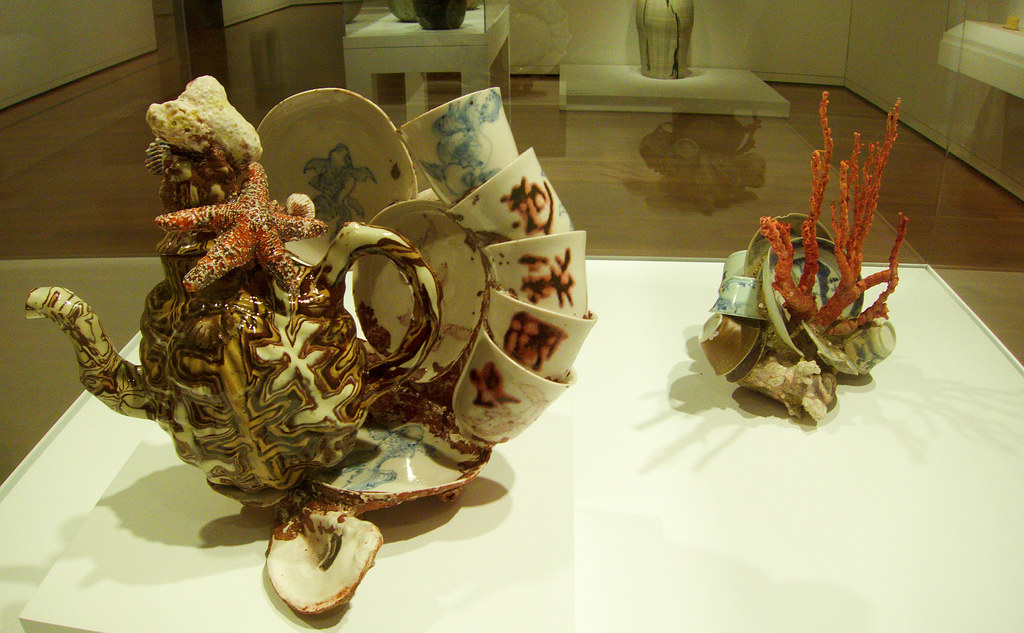ITM Readers: We're proud to bring to you this guest posting from a very important person!
Maken Melodye on #WhanThatAprilleDay16
by GEOFFREY CHAUCER [aka @LeVostreGC]
Goode
Friendes and Readers of Yn The Middel,
Yt
doth fill my litel herte wyth gret happinesse to invyte yow to the thirde yeare
of a moost blisful and plesinge celebracioun.
On
the first daye of Aprille, lat us make tyme to take joye yn alle langages that
are yclept ‘old,’ or ‘middel,’ or ‘auncient,’ or ‘archaic,’ or, alas, even
‘dead.’
Thys
feest ys yclept ‘Whan That Aprille Day.’ For thys yeare yt ys: 'Whan That
Aprille Day 16.' #WhanThatAprilleDay16
Ich
do invyte yow to joyne me and manye othir goode folk yn a celebracioun across
the entyre globe of the erthe. Yn thys celebracioun we shal reade of oold bokes
yn sondrye oold tonges. We shal singe olde songes. We shal playe olde playes.
Eny oold tonge will do, and eny maner of readinge. All are welcome. We shal
make merrye yn the magical dreamscape of 'social media,' and eke, yf ye kan do
yt, yn the material plane of the 'real worlde' as wel.
Ye
maye, paraventure, wisshe to reade from the beginning of my Tales of Caunterburye, but ye maye also wisshe
to reade of eny oothir boke or texte or scroll or manuscript that ye love. Ye
maye even reade the poetrye of John Gower yf that ys yower
thinge.
What
are sum wayes to celebrate Whan That Aprille Daye?
Gentil
frendes, yf yt wolde plese yow to celebrate Whan That Aprille Daye 2016, ye
koude do eny of the followinge. Be sure to use the hasshe-tagge #WhanThatAprilleDay16
on yower poostes of twytter and facebooke and blogge.
•
Counte downe to Whan That Aprille Daye wyth postes and readinges.
•
Maken a video of yowerself readinge (or singinge! or actinge!) and share yt on
the grete webbe of the internette.
•
Planne a partye at yower classroome or hous to celebrate oolde langages, and
poost pictures to the ynternette.
•
Read auncient langages to yower catte, and the catte shal be moost mirthful.
• Make
sum maner of cake or pastrye wyth oold wordes upon yt, and feest upon yt wyth
good folke and share pictures of yower festivitee. (And yet beware the catte
that shal seke to ruin the icinge.)
•
Yf ye be bold, ye maye wisshe to share yower readinge yn publique, yn a slam of
poesye or a nighte of open mic. (Bringe the catte?)
• Yf
ye worke wyth an organisatioun or scole, ye maye wisshe to plan sum maner of
event, large or smal, to share writinge yn oold langages.
•
And for maximum Aprillenesse, marke all tweetes and poostes wyth the
hashtagge #WhanThatAprilleDay16 – remember the ‘Whan’ and ‘Aprille.’
What
ys the poynte of Whan That Aprille Daye?
Ower
mission ys to celebrate al the langages that have come bifor, and alle their
joyes and sorrowes and richesse.
Ower
mission ys to remynde folk of the beautye and grete lovelinesse of studyinge
the wordes of the past. And eke ower mission ys to bringe to mynde the
importaunce of supportinge the scolership and labour that doth bringe thes
wordes to us. To remynde folk to support the techinge of paleographye and of archival werke and eek, ywis, the techinge of thes
oold langages. To remynde folk of the gret blisse and joye of research
libraryes and the gret wysdam and expertyse of the libraryans that care for
them across the centuryes. To call to mynde the fundinge of the humanityes, the
which ys lyke the light of the sonne on the plantes of learninge and knowledge.
For wythout al of thes, the past wolde have no wordes for us.
Ower
mission ys also to have ynogh funne to last until next Whan That Aprille
Daye.
Note
that thys event doth also coincide wyth Aprille Fooles Daye, the which ys fyne
by cause we do love thes langages and alle who love are yn sum maner also
fooles.
Ich
do hope wyth al myn herte that that sum of yow good folke will joyne me on thys
April first for readinge and celebratinge and foolinge. Lat us maken melodye on #WhanThatAprilleDay16
Wyth
muchel love and admiracioun
Le
Vostre
GC
P.S. Some other links for hose who might be interested:
- Inaugural Whan That Aprille Day (in 2014): roundup at the Global Chaucers blog [with the General Prologue's opening lines in twelve modern languages]
- Middle English Texts Series (METS) countdown to Whan That Aprille Day in March 2014 [full twitter archive]
- Recitations in Old English, Latin, and Middle English by some of the bloggers at In The Middle on Whan That Aprille Day 2014 [listen online]
- A curated archive of tweets from Whan That Aprille Day 2015





